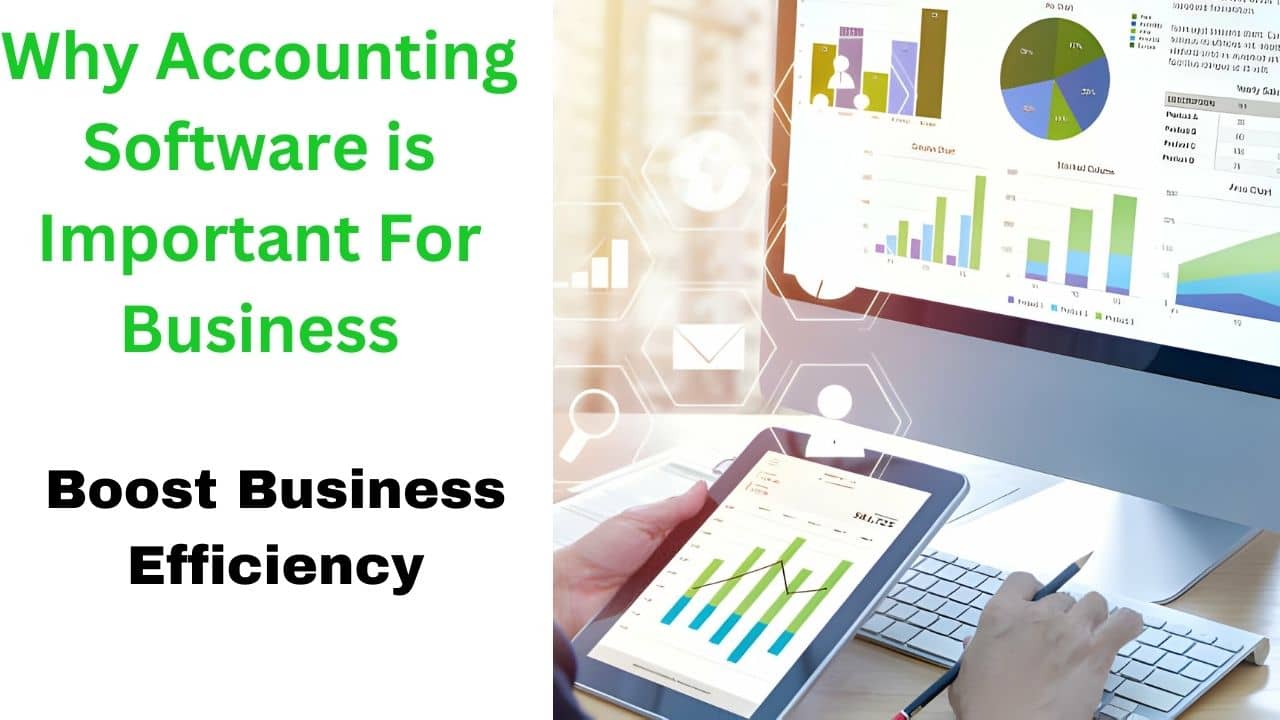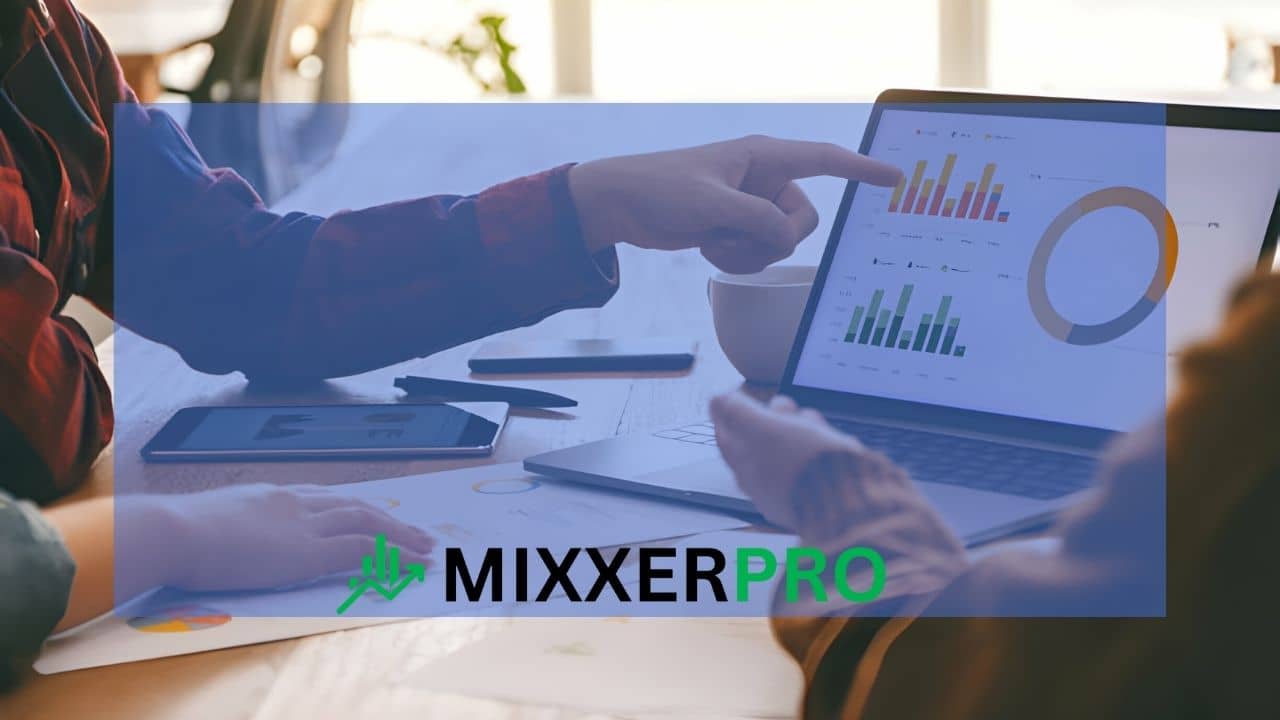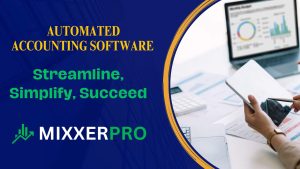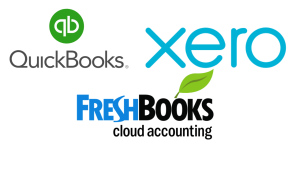Why Accounting Software is Important For Business
Table of Contents
Accounting software is essential for businesses as it helps accurately manage financial transactions and streamline the accounting process. It provides real-time insights, automates tasks, minimizes errors, and improves efficiency.
With accounting software, businesses can track expenses, generate invoices, manage payroll, maintain financial records, and quickly generate financial statements, allowing them to make informed decisions and stay compliant with tax regulations. This essential tool saves time, reduces manual workload, and provides valuable financial data for businesses to analyze and plan for future growth.
The Importance Of Business Efficiency
Efficient business operations are crucial, and accounting software is vital. By automating financial processes and streamlining record-keeping, businesses can save time, reduce errors, and make better-informed decisions. Stay ahead with the right tools for improved business efficiency.
Reducing Costs
Accounting software plays a crucial role in reducing costs for businesses. By automating various financial processes, including invoicing, expense tracking, and payroll management, companies can save valuable time and resources that would otherwise be spent on manual paperwork and data entry.
With accounting software, businesses can effortlessly track expenses and identify areas where costs can be minimized. By having access to real-time financial data, companies can make more informed decisions about budgeting and expenditure, ultimately leading to cost savings and improved profitability. Additionally, accounting software can help businesses identify financial inefficiencies, such as redundant expenses or ineffective revenue streams, allowing them to address these issues proactively.
Improving Productivity
Another critical advantage of accounting software is its ability to improve business productivity. By automating financial processes, employees can allocate their time and energy to more value-added tasks, such as customer service or strategy development.
Accounting software eliminates the need for manual calculations and data entry, reducing the likelihood of human error and saving employees from repetitive and time-consuming tasks. This increased efficiency translates into faster turnaround time for financial processes, such as generating invoices or reconciling bank statements. With accounting software, businesses can operate more smoothly and make the most of their resources instead of getting bogged down by administrative tasks.
Enhancing Decision-making
The availability of accurate and up-to-date financial data provided by accounting software is instrumental in enhancing business decision-making. A clear understanding of the company’s financial health allows business owners and managers to make informed choices that can positively impact the future of their organization.
By leveraging the insights and reports generated by accounting software, businesses can gain a comprehensive view of their financial performance, including revenue, expenses, and profitability. This allows them to identify trends, patterns, and areas for improvement. With this knowledge, businesses can make strategic decisions, such as investing in growth opportunities, cutting costs, or adjusting pricing strategies.
In conclusion, accounting software is vital for businesses looking to enhance their overall efficiency. By reducing costs, improving productivity, and enhancing decision-making, companies can streamline their financial processes and position themselves for long-term success.
Understanding Accounting Software
Accounting software is an essential tool for businesses of all sizes. It helps streamline financial management, making it easier to track income and expenses, generate reports, and analyze financial data. With the right accounting software, businesses can save time, reduce errors, and make informed decisions based on accurate financial information.
Why Accounting Software is Important For Business
What Is Accounting Software?
Accounting software is a computer program designed to help businesses manage their financial transactions, accounts, and processes. It is a central hub for tracking income, expenses, assets, liabilities, etc. Accounting software automates essential financial tasks, from invoicing and payroll management to tax preparation and financial reporting, eliminating manual calculations and paperwork.
Features And Benefits
Modern accounting software offers many features and benefits that can significantly benefit businesses. Here are some key features and benefits that make accounting software so crucial for business success:
- Automation: Accounting software automates repetitive tasks, such as data entry and calculations, saving time and reducing the risk of errors.
- Accurate Financial Records: By keeping track of income and expenses in one centralized system, accounting software provides a comprehensive view of a business’s financial health, making it easier to create accurate financial statements and reports.
- Invoicing and Payment: With accounting software, businesses can easily create and send professional invoices to clients, track payment statuses, and manage overdue payments.
- Expense Management: Accounting software simplifies expense tracking by allowing businesses to record expenses, categorize them, and generate expense reports for reimbursement or tax purposes.
- Payroll: Many accounting software solutions include payroll management features, enabling businesses to automate payroll calculations, create payslips, and ensure compliance with tax regulations.
- Tax Preparation: Accounting software often integrates with tax software or provides tax-specific features, facilitating tax preparation and filing.
- Financial Reporting and Analysis: Accounting software offers reporting and analysis tools to help businesses gain insights into their financial performance, identify trends, and make data-driven decisions.
Types Of Accounting Software
There are various types of accounting software available to cater to different business needs. The most common types are:
| Type | Description |
| 1. Cloud-based Accounting Software: | Cloud-based accounting software is hosted on the internet and accessed through a web browser. It offers flexibility and scalability and allows for real-time collaboration among users. Businesses can access their financial data anytime, anywhere with an internet connection. |
| 2. Desktop Accounting Software: | Desktop accounting software is installed on a computer or local server. It offers robust features and gives businesses complete control over their financial data. However, it lacks the mobility and accessibility of cloud-based software. |
| 3. Industry-Specific Accounting Software: | Industry-specific accounting software is designed to meet the unique needs of particular industries. It often includes features tailored to specific industries like construction, healthcare, or hospitality. |
Choosing the correct type of accounting software depends on the size and nature of the business, budget considerations, and specific requirements.
Investing in accounting software is an investment in efficient financial management. Accounting software empowers businesses to make informed decisions, save time, and improve overall financial performance by automating tasks, providing accurate records, and enabling comprehensive financial analysis.
Streamlining Financial Management
Accounting software is crucial for businesses seeking to streamline financial management. Automating tasks and providing real-time data enable more efficient tracking of expenses, revenue, and cash flow, ultimately leading to better decision-making and improved overall financial performance.
Automating Bookkeeping
One of the critical benefits of accounting software is the ability to automate bookkeeping tasks. Manually recording all financial transactions can be time-consuming and prone to errors. By utilizing accounting software, businesses can eliminate manual data entry and instead rely on automated processes that accurately record and categorize income and expenses.
Tracking Expenses And Income
Accounting software allows businesses to easily track their expenses and income. With just a few clicks, you can generate reports that provide detailed insights into your financial activity. By regularly monitoring your expenses and income, you can analyze your financial health and make informed decisions to improve your bottom line.
Managing Invoices And Payments
Efficiently managing invoices and payments is crucial for the success of any business. Accounting software simplifies this process by allowing you to create and send customized invoices to your clients, track payment status, and even set up automatic reminders for overdue payments. Streamlining your invoicing and payment processes can improve cash flow and ensure a steady revenue stream for your business.
Accounting software is crucial for businesses as it improves reporting and analysis. Its robust features enable companies to track financial data effectively, make informed decisions, and enhance productivity. Stay ahead of the competition and maintain financial transparency with the right accounting software.
Generating Financial Reports
Accounting software plays a crucial role in improving reporting and analysis for businesses. One of the key benefits it offers is the ability to generate accurate and detailed financial reports. These reports provide:
- Valuable insights into the financial health of a company.
- Showing its income, expenses, and profitability.
- Overall financial performance.
With accounting software, businesses can quickly generate financial reports such as balance sheets, income statements, and cash flow statements, essential for making informed financial decisions.
Generating financial reports through accounting software eliminates the need for manual calculations and reduces the chances of errors, ensuring the accuracy and reliability of the data. Businesses can access up-to-date financial information whenever needed by automating the report generation process. This enables decision-makers to clearly understand the company’s financial position and make well-informed strategic decisions based on real-time data.
Analyzing Key Performance Indicators
Another important aspect of reporting and analysis is the ability to analyze key performance indicators (KPIs). KPIs are specific metrics that measure the success of a business in achieving its goals and objectives. Accounting software provides the necessary tools to track and analyze KPIs efficiently. It allows enterprises to monitor vital financial metrics such as gross margin, return on investment (ROI), debt-to-equity ratio, etc.
By using accounting software, businesses can quickly generate reports highlighting these KPIs, allowing for a deeper understanding of the company’s performance. Analyzing these indicators helps identify areas of strength and weakness, enabling business owners and managers to make data-driven decisions to drive growth and profitability. Whether it’s monitoring sales trends, analyzing customer acquisition costs, or evaluating inventory turnover rates, accounting software empowers businesses to analyze and optimize their KPIs for better performance.
Forecasting And Budgeting
Accurate forecasting and budgeting are crucial for businesses to plan for the future and make informed financial decisions. Accounting software simplifies these processes by providing robust forecasting and budgeting tools.
Businesses can utilize accounting software to create detailed budgets for different departments, projects, or periods. These budgets can be based on historical data and future projections, ensuring businesses have a solid financial plan. By comparing actual financial performance against the budgeted figures, companies can quickly identify deviations and promptly take corrective action.
Furthermore, accounting software allows businesses to forecast future revenues, expenses, and cash flow based on trends and market conditions. This enables them to anticipate potential challenges and opportunities and adjust their strategies accordingly.
With the help of accounting software, businesses can easily update and track their budgets and forecasts, ensuring they are always working with the most accurate and up-to-date financial information. This improves the accuracy of financial planning and enables businesses to make proactive decisions to achieve their goals and objectives.
Enhancing Compliance And Accuracy
Accounting software is vital for businesses as it enhances compliance and accuracy. Automating tasks reduces human error and ensures adherence to regulatory standards, resulting in more precise financial data. Improve your business operations with reliable accounting software.
Maintaining Data Integrity
One of the critical reasons why accounting software is essential for businesses is its ability to enhance compliance and accuracy. By implementing accounting software, companies can maintain data integrity, ensuring that financial information is accurate and reliable. Manual bookkeeping methods are prone to human error and can lead to miscalculations or incorrect data entries. With accounting software, businesses can automate data entry and perform automatic calculations, reducing the risk of errors and improving the overall accuracy of financial records.
Tracking Compliance With Regulations
Another significant advantage of accounting software is its ability to track regulation compliance. Businesses must abide by various financial and accounting regulations, such as tax laws, reporting standards, and industry-specific regulations. Failure to comply with these regulations can result in fines, penalties, or legal consequences. Accounting software can help businesses stay compliant by providing features like tax calculation, automated financial report generation, and real-time updates on changing regulations. With these functionalities, companies can ensure that their financial operations align with the required regulations, thereby minimizing non-compliance risk.
Facilitating Audit Processes
In addition to maintaining data integrity and tracking compliance, accounting software also facilitates audit processes. Businesses must provide accurate financial records and supporting documentation to auditors during an audit. Manual record-keeping can be time-consuming and result in missing or misplaced documents, making the audit process inefficient and more prone to errors. Accounting software streamlines the audit process by organizing financial data and documentation in a centralized and easily accessible system. With just a few clicks, businesses can retrieve the necessary information and provide it to auditors, saving time and ensuring a smoother audit experience.
Increasing Collaboration And Accessibility
Accounting software plays a crucial role in facilitating collaboration and accessibility for businesses. It streamlines financial processes, allowing teams to easily collaborate on economic data and access real-time information from anywhere. With its user-friendly interfaces and advanced features, accounting software simplifies tasks, enhances communication, and improves overall business efficiency.
Increasing Collaboration and Accessibility In today’s fast-paced business environment, collaboration and accessibility are critical factors in driving success. Accounting software enhances these aspects by providing centralized data storage, multi-user access and permissions, and integration with other business systems.
Centralized Data Storage
Effective collaboration requires easy access to up-to-date financial information. Accounting software offers a centralized data storage solution, eliminating the need for manual record-keeping or searching through multiple spreadsheets or paper documents. With all the financial data stored in one secure location, team members can quickly access the information they need, saving time and improving efficiency. Moreover, centralized data storage ensures data integrity and accuracy. Any changes or updates made to the data are immediately reflected for everyone with access, reducing the risk of errors or discrepancies. This eliminates the frustration and confusion arising from outdated or conflicting financial information.
Multi-user Access And Permissions
Collaborative teamwork often involves multiple individuals working on various accounting tasks simultaneously. Accounting software provides multi-user access, allowing team members to work on the same platform concurrently. This streamlined approach promotes real-time collaboration, as users can view, update, and analyze financial data simultaneously. Accounting software also offers customizable access permissions to maintain data integrity and confidentiality. Administrators can assign each team member specific roles and access levels, ensuring that sensitive financial information is only accessible to authorized personnel. This feature enhances collaboration while safeguarding against unauthorized access or data breaches.
Integration With Other Business Systems
To maximize collaboration and optimize workflows, accounting software can integrate with other business systems, such as project management software, customer relationship management (CRM) tools, or inventory management systems. This integration allows for seamless data exchange between different departments or applications, eliminating redundant manual entry and reducing the chances of errors. For instance, integrating accounting software with a CRM system enables sales teams to generate invoices or quotes directly from customer records. This streamlines the process, reduces the likelihood of errors, and enhances collaboration between sales and finance teams. Similarly, integrating accounting software with project management tools helps track expenses, manage budgets, and monitor profitability. This integration enables project teams to access up-to-date financial information, facilitating more effective decision-making and promoting collaboration across departments.
In conclusion, accounting software is essential for business as it enhances collaboration and accessibility. By providing centralized data storage, multi-user access and permissions, and integration with other business systems, accounting software enables teams to work together efficiently, improving productivity and supporting informed decision-making. Embracing this technology is a wise choice for businesses looking to stay competitive in today’s collaborative and dynamic business world.
Why Accounting Software is Important For Business
Choosing The Right Accounting Software
In today’s fast-paced business world, having the right accounting software can be a game-changer for your company. With so many options available, finding the perfect fit for your business needs can be overwhelming. That’s why identifying your business needs, evaluating software features, and considering your budget and scalability are crucial steps in decision-making. This section will explore these factors in detail to help you make an informed choice.
Identifying Business Needs
Before diving into the world of accounting software, it is essential to understand your business’s unique requirements. Take the time to analyze your current financial processes and identify pain points that need addressing. Do you need help with manual data entry, inefficient reporting, or a lack of real-time insights? You can prioritize the features you need in an accounting software solution by pinpointing these challenges.
When identifying your business needs, consider the following factors:
- The size of your business: Are you a small startup or an established enterprise?
- The complexity of your financial transactions: Do you have multiple revenue streams, international operations, or complex taxation requirements?
- Your industry-specific needs: Different industries have unique accounting requirements. For example, a manufacturing business may need inventory management capabilities, while a service-based company may require robust time-tracking features.
By carefully evaluating these aspects, you can narrow down the accounting software options that align with your business needs.
Evaluating Software Features
Once you clearly understand your business needs, it’s time to evaluate the features offered by different accounting software solutions. Look for features that address your pain points and streamline your financial processes. Some key features to consider include:
- Automation: Can the software automate repetitive tasks like invoicing, payroll, and expense tracking?
- Financial reporting: Does the software provide customizable reporting templates and real-time insights to help you make data-driven decisions?
- Integration capabilities: Can the accounting software seamlessly integrate with other business management tools like CRM or project management software?
- Data security: Does the software have robust security measures to protect your financial data?
Make a checklist of the must-have features for your business and compare them against the offerings of different accounting software providers. This will help you narrow your options and find the best fit for your requirements.
Considering Budget And Scalability
While choosing accounting software, it is crucial to consider your budget and scalability. Your budget should cover the initial purchase cost and ongoing maintenance, upgrades, and any additional training required for your team.
Scalability is equally important, especially if you have growth plans. Ensure that the software you choose can accommodate your future needs, such as increased users or expanded features.
Implementing Accounting Software
When streamlining your business operations, implementing accounting software is crucial to achieving efficiency, accuracy, and productivity. Accounting software automates routine financial tasks and provides valuable insights into your business’s financial health. This article will explore the different aspects of implementing accounting software, including data migration and setup, staff training and support, and monitoring and continuous improvement.
Data Migration And Setup
While implementing accounting software, one of the first steps is migrating your existing financial data onto the new platform. Meticulous data migration ensures a smooth transition, eliminating potential data loss or discrepancies. It involves extracting data from various sources, such as spreadsheets, manual records, or legacy systems, and importing it into the accounting software. Proper data mapping and validation are vital to ensure the accuracy and integrity of the migrated data.
Once the data migration is complete, the next crucial step is setting up the accounting software according to your business’s needs. This includes configuring general ledger accounts, creating a chart of accounts, setting up tax codes and rates, establishing payment methods, and defining user roles and permissions. Proper setup ensures the software aligns with your business structure and requirements, enabling smooth and accurate financial operations.
Staff Training And Support
Introducing accounting software to your team may require training and support to ensure efficient utilization. Training sessions can be arranged to familiarize your staff with the features and functionalities of the software, enabling them to perform tasks effectively. Comprehensive training equips your employees with the skills and knowledge to navigate the software, enter data accurately, generate financial reports, and utilize the software’s advanced capabilities.
Furthermore, ongoing technical support is essential to address any queries or issues arising during the implementation process and subsequent usage of the accounting software. Access to prompt and reliable support helps your team overcome obstacles and minimizes downtime, ensuring a smooth transition and uninterrupted financial operations.
Monitoring And Continuous Improvement
Implementing accounting software is not a one-time task but an ongoing effort to optimize your financial processes. Regular monitoring and continuous improvement help you identify any inefficiencies or bottlenecks in your accounting system and make necessary adjustments. By analyzing financial reports and generating insights, you can pinpoint areas of improvement, enhance accuracy, streamline workflows, and ultimately drive better financial decision-making.
Moreover, accounting software often provides analytics and reporting capabilities that enable you to track key performance indicators (KPIs) and monitor the financial health of your business in real time. This empowers you to stay informed about cash flow, profitability, revenue patterns, and expense management, allowing you to make informed strategic decisions for the sustainable growth of your business.
Addressing Common Challenges
Running a successful business requires overcoming a variety of challenges. Regarding accounting, organizations often need help with efficiency and accuracy. Fortunately, utilizing accounting software can help address these challenges, providing solutions that improve data security and privacy, streamline integration processes, and aid in user adoption and change management.
Data Security And Privacy
Data security and privacy are critical concerns for any business, especially when dealing with sensitive financial information. With the rise in cyber threats and regulations like the General Data Protection Regulation (GDPR), companies must prioritize safeguarding their financial data.
Accounting software is crucial in addressing these concerns by offering robust security features. It includes advanced encryption methods to protect data in transit and at rest. This ensures that only authorized individuals have access to sensitive information. Additionally, regular software updates and patches help safeguard against emerging threats.
By centralizing financial data within the software, businesses can monitor and control access to different users. This helps prevent unauthorized modifications or breaches of confidential information. Having secure and reliable accounting software in place protects your business from potential cyberattacks and ensures compliance with stringent data privacy regulations.
Integration Issues
Integrating accounting processes and data can be challenging for businesses operating with different software systems across various departments. Lack of integration leads to manual data entry, which consumes valuable time and increases the risk of errors. Fortunately, accounting software offers seamless integration capabilities that address this challenge.
Modern accounting software applications can integrate with other software systems, such as CRM, inventory management, and payroll, enabling automatic data transfer and updates. This eliminates the need for duplicate entries and significantly reduces the chances of data discrepancies. By streamlining the integration process, accounting software promotes data accuracy, enhances operational efficiency, and facilitates better decision-making.
User Adoption And Change Management
Introducing new software to an organization often comes with resistance and hesitation from employees. User adoption and change management are essential components of successfully implementing accounting software.
To overcome this challenge, it is crucial to choose accounting software that is intuitive, user-friendly and provides comprehensive training and support. Such software typically includes a user-friendly interface that simplifies complex accounting tasks, minimizing the learning curve for employees. Offering training sessions, tutorials, and responsive customer support also helps users get acquainted with the software and address any issues or concerns.
Moreover, involving key stakeholders from different departments and explaining the benefits of the accounting software can encourage user adoption. Clear communication about the impact of the software on daily operations and the organization’s overall goals will help employees understand the importance of embracing change.
Benefits of Addressing Common Challenges
By addressing these common challenges through the use of accounting software, businesses can experience a multitude of benefits.
- Enhanced data security and privacy safeguard the organization’s financial information.
- Streamlined integration processes reduce manual work and data discrepancies.
- Simplified user adoption and change management improve overall productivity and efficiency.
Investing in reliable accounting software ensures smooth financial operations and creates a solid foundation for future growth and success.
Credit: www.netsuite.com
Case Studies: Success Stories
Real-life success stories can be the most compelling proof of the benefits of accounting software for businesses. These case studies highlight how accounting software has revolutionized the financial management processes of small companies and transformed the operations of large enterprises. Let’s look at a few of these remarkable success stories and discover the game-changing solutions accounting software brings.
Small Business With Increased Efficiency
In today’s fast-paced business environment, small businesses must be agile and efficient to stay competitive. This is where accounting software steps in, streamlining financial operations and enabling small businesses to focus on growth and deliver value to their customers. One such success story involves a local flower shop, Blossom Buds, which saw a significant increase in efficiency after implementing accounting software.
Like many other small businesses, Blossom Buds struggled with manually managing invoices, tracking expenses, and reconciling bank statements. This often resulted in errors, wasted time, and missed opportunities. However, by implementing an accounting software solution, Blossom Buds experienced a transformation. They were able to automate their invoicing process, accurately track expenses, and gain real-time visibility into their financial health.
The software’s user-friendly interface allowed the flower shop owners to easily manage their finances, freeing up valuable time that could be redirected towards serving customers and developing creative floral arrangements. The automated invoicing system streamlined their operations and improved cash flow as customers received invoices promptly, enhancing customer satisfaction and loyalty.
Additionally, with clear insights from the software, Blossom Buds could identify trends, track inventory, and make data-driven decisions to optimize their business strategies. This newfound efficiency and control played a crucial role in their growth, enabling them to expand their customer base and elevate their brand presence.
In conclusion, adopting accounting software was a game-changer for small businesses like Blossom Buds. It alleviated the burdens of manual financial management, increased efficiency, enhanced customer satisfaction, and empowered the company to thrive in a competitive landscape.
Large Enterprise Transformations
Accounting software is not just limited to small businesses; it also has the power to transform the operations of large enterprises. A prime example is GlobalTech, a multinational technology company specializing in cutting-edge solutions. Before implementing accounting software, GlobalTech faced numerous challenges in managing financial data across multiple departments, divisions, and locations.
The lack of integration and visibility resulted in delayed reporting, inaccuracies, and disjointed decision-making processes. However, with the introduction of accounting software, GlobalTech experienced a comprehensive transformation of its financial management processes.
The software seamlessly integrated with their existing systems, allowing real-time data synchronization and consolidation. This enabled department heads, executives, and financial teams to access accurate and up-to-date financial information at any given time. With a centralized system, economic data was standardized, eliminating discrepancies and reducing the risk of errors.
GlobalTech also benefited from the software’s advanced reporting capabilities. Generating comprehensive financial reports became effortless, and crucial financial insights were now readily available for analysis and strategic planning. With data-driven decision-making, the company improved cost control, optimized resource allocation, and identified areas for revenue growth.
Moreover, the software’s robust security features ensured data integrity and compliance with industry regulations. With user permissions and access controls, GlobalTech could safeguard sensitive financial information and mitigate the risk of unauthorized access.
Accounting software revolutionized GlobalTech’s financial management processes, fostering transparency, enhancing decision-making, and promoting organizational efficiency. It became an indispensable tool in managing their complex economic landscape and driving their business forward.
Frequently Asked Questions For Why Accounting Software Is Important For Business
Why Is Accounting Software Important In Business?
Accounting software is crucial for businesses as it streamlines financial tasks, tracks expenses, and manages transactions efficiently. It provides real-time insights, aids in making informed decisions, and ensures accurate financial records. Accounting software saves time, reduces manual errors, and enhances business productivity.
What Are The Major Advantages Of Accounting Software?
Accounting software provides several significant advantages: streamlining financial tasks, reducing human errors, improving accuracy, facilitating efficient record-keeping, and generating insightful reports. Its user-friendly interface and automation capabilities simplify financial management, increase productivity, and save time for businesses of all sizes.
Why Is The Accounting System Important To Business Organizations?
The accounting system is crucial for business organizations as it helps them keep track of their financial transactions, manage expenses and income, and generate accurate financial statements. It also enables businesses to comply with legal and tax requirements, make informed decisions, and assess the company’s financial health.
How Can Accounting Software Help A Business Grow?
Accounting software enables businesses to enhance their growth by streamlining financial processes, automating tasks, and providing real-time insights. It helps track income and expenses, manage inventory, generate reports, and simplify tax calculations. This improves efficiency, saves time, reduces errors, and allows businesses to make informed decisions for future growth.
Conclusion
Accounting software plays a crucial role in the success of businesses. Its ability to automate financial tasks, track expenses, and generate accurate reports saves time and enhances efficiency. Providing real-time insights into financial health enables informed decision-making and helps businesses stay ahead of the competition.
Embracing accounting software is a wise investment for any business, big or small, to streamline operations and maximize profitability.






